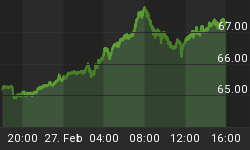Many people think that because the US dollar is the world's reserve currency that people/central banks must continue to own the dollar. This is flawed. What the US dollar's reserve currency status actually means is that people/central banks already own the US dollar. What it does not mean is that anyone, domestic or foreign, has to hold on to dollars, let alone accumulate more.
A recent illustration of what happens when something is over owned like the US dollar is the US housing bubble. A common argument made at the height of the madness was that housing was not a bubble because everyone needed somewhere to live. However, there were no housing shortages. The bubble developed because of speculation and over ownership fueled by cheap capital. This allowed people to buy multiple homes for investment and flipping purposes. When they began selling their extra homes, prices fell because supply that had been hoarded and kept out of the market overwhelmed demand.
Similarly with the US dollar, almost all citizens and governments around the world with the exception of the poorest nations, already own US dollars. These dollars are held as savings and in reserves and are therefore kept off the market, yet they do exist. What is even more remarkable is that instead of 3 years of mass buying of houses, the rest of the world has been euphorically buying dollars for decades. The chart below shows the rapid growth in US dollar reserves around the world.

Cheap capital also applies to the dollar bubble just as it did with the housing bubble. Currency pegs have terribly distorted currency markets. A central bank, unlike an investor/citizen, has no cost of capital. Its only cost is the devaluation of a currency by printing too much of it. In the case of China, when we send dollars to buy goods, the manufacturer sends those dollars to the central bank, which issues new Chinese renminbi in exchange. Those dollars are then hoarded (owned) by the central bank and never hit the market as with a free floating peg. As hard as it is to believe, central bank intervention has caused capital to be even cheaper in the case of the dollar bubble than it was for subprime borrowers during the housing bubble.
To reiterate, reserve currency status does not ensure that there is any value to the US dollar today or in the future; only strong fundamentals can provide value to the US dollar. The only reason for its reserve status is that in the past the dollar was recognized as having value. Due to its historical strength and foreign accumulation, despite its poor fundamentals, the dollar has become the most over owned and thus overvalued asset in the world. As holders of dollars around the world begin to diversify their personal savings or foreign reserves, those still owning US dollars will suffer greater losses than investors in housing. And remember, it only took a small percentage of all homes to hit the market to send home prices spiraling downwards. Only a few holders of dollars have to be sellers, not the entire world.















